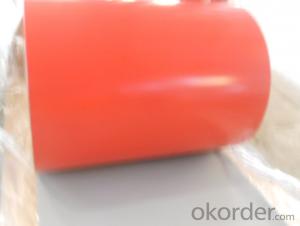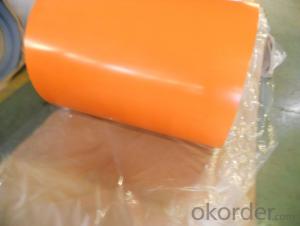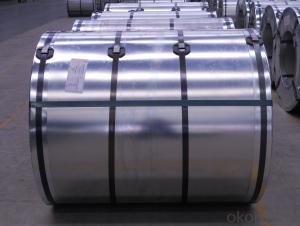Prepainted Galvanized Steel in Coil
- Loading Port:
- China Main Port
- Payment Terms:
- TT OR LC
- Min Order Qty:
- -
- Supply Capability:
- -
OKorder Service Pledge
OKorder Financial Service
You Might Also Like
Product Description:
Prepainted Galvanized Steel
With galvanized steel as base metal, after pretreatment (degrease and chemical treatment) and liquid dope with several layers of color, then after firing and cooling, finally the plate steel is called pre-painted galvanized steel. Pre-painted galvanized steel is good capable of decoration, molding, corrosion resistance. It generally displays superior workability, durability and weather resistance.
Brand Name: HBSTEEL
Specifications OfPrepainted Galvanized Steel
Thickness 0.20-1.2mm (BMT) Width 600-1250mm |
Zinc Coating 100-275g/m2 |
Color According to RAL color fan or as per request |
Internal Diameter 508mm or 610mm |
Coil Weight 3-6MT |
Quality Commercial and structural quality |
Paint Polyester paint for topside, epoxy for reverse |
Standard JIS G 3312, ASTM A755M, EN 10169 |
Base Steel Grade SGCC,SGCD,DX51D+Z,DX52D+Z;S200GD,S220GD,S280GD,S350GD,CS,FS,SS |
Chemical Composition Of Prepainted Galvanized Steel
C | Si | Mn | P |
0.04-0.06% | 0.01-0.03% | 0.18-0.22% | 0.014-0.016% |
Technical Data Of Prepainted Galvanized Steel
Yield Strength | (Mpa) 280-320 |
Tensile Strength | (Mpa) 340-390 |
Elongation | 20%-30% |
Reverse Impact | 9J |
T-bending | ≥2T |
Pencil Hardness | ≥2H |
Duration Of Salt Spray Test | 500 H |
Bending At 180 Degree | No crack, purling and fraction |
Applications OfPrepainted Galvanized Steel
It can be widely used in transportation, light industry, civil usage and farming. It is also the perfect building material in construction for making steel roofing,insulation panel, corrugate sheet, facade wall,shutters,T-bar and home appliance.
- Q:How do steel coils contribute to the manufacturing of electrical equipment?
- Due to their unique properties and versatility, steel coils play a crucial role in the manufacturing of electrical equipment. Transformer cores, essential components in electrical equipment, rely on steel coils for efficient energy transfer and reduced energy losses. The magnetic properties of steel make it an ideal material for transformer cores, allowing for the transformation of voltage levels and ensuring proper equipment functioning. In addition, steel coils are widely used in the production of motors and generators, which convert electrical energy into mechanical energy and vice versa. The coil shape of steel enables the creation of electromagnetic fields, necessary for the operation of motors and generators. Moreover, the strength and durability of steel coils enable them to withstand high temperatures and mechanical stresses commonly encountered in electrical equipment. Furthermore, steel coils are utilized in the construction of electrical conductors, including wires and cables, enabling the transmission of electricity from power sources to various electrical devices. Steel's high electrical conductivity ensures efficient power transmission, while also providing mechanical strength and protection against corrosion and wear. The coil shape of steel wires enhances their flexibility, making them suitable for various applications in electrical equipment manufacturing. Overall, steel coils make a significant contribution to the manufacturing of electrical equipment by providing the necessary magnetic properties for transformer cores, enabling the generation of electromagnetic fields in motors and generators, and facilitating efficient power transmission in electrical conductors. Their versatility, strength, and durability make them an indispensable component in the production of reliable and high-performance electrical equipment.
- Q:How are steel coils used in the manufacturing of automotive hoods?
- Steel coils are used in the manufacturing of automotive hoods as they are shaped and formed into the desired hood design. These coils are processed through various stages such as cutting, stamping, and welding to create the hood's structure. The strength and durability of steel make it an ideal material for automotive hoods, ensuring they can withstand impacts and provide protection to the engine compartment.
- Q:What are the different types of corrosion protection methods used for steel coils?
- There are several types of corrosion protection methods used for steel coils, including: 1. Coating: Applying a protective layer of paint or coating, such as epoxy or zinc, on the surface of the steel coil to prevent direct contact with moisture and corrosive substances. 2. Galvanization: Immersing the steel coil in a bath of molten zinc to create a protective zinc coating, which acts as a sacrificial layer that corrodes first before the steel. 3. VCI (Volatile Corrosion Inhibitors): Using volatile chemicals that release protective vapors, which form a thin layer on the steel coil's surface, inhibiting corrosion by blocking moisture and oxygen. 4. Passivation: Treating the steel coil with chemicals like nitric acid to remove impurities, creating a passive oxide layer that protects against corrosion. 5. Cathodic Protection: Connecting the steel coil to a sacrificial anode (usually made of zinc or magnesium) or using impressed current to provide a flow of electrons, which prevents corrosion by making the steel coil the cathode in an electrochemical cell. 6. Environmental Control: Maintaining controlled temperature, humidity, and atmospheric conditions during storage and transportation to minimize exposure to corrosive elements. These methods can be used individually or in combination, depending on the specific requirements and environmental conditions.
- Q:How are steel coils protected from condensation?
- Steel coils are protected from condensation through a variety of methods including the application of moisture-resistant coatings, the use of desiccants or drying agents, and the implementation of proper storage and handling techniques such as maintaining appropriate temperatures and humidity levels.
- Q:I am building a robot for Bots IQ. In doing so i have the option of building the the armor of my robot out of titanium or tool steel.. which would be the better option.Brief description of Bots IQ: It is a competition where 2 15lb robots go and attack each other with spinning blades, hammers or whatever is designed.
- Titanium is a significantly stronger and lighter metal, but is also extremely expensive. If you have the option for titanium, go for it.
- Q:which metals have a higher density than steel? and how does the density compare to steel( example: tungsten carbide is 2x [i think] more dense than steel.)
- Stainless steel 7480 -8000 kg/m^3 Brass 8100 -8250 Cobalt - 8746 Copper 8930 Gold 19320 Lead 11340 Mercury 13593 Molybdenum 10188 Nickel 8800 Platinum 21400 Plutonium 19800 Silver 10490 Tungsten 19600 Uranium 18900
- Q:How are steel coils processed for edge conditioning or slitting?
- Steel coils are processed for edge conditioning or slitting through a series of steps. First, the coils are inspected for any defects or irregularities. Then, the coils are uncoiled and leveled to ensure a flat surface. After that, the edges are trimmed or conditioned to remove any imperfections. Finally, the coils are slit into narrower strips according to the desired width.
- Q:How are steel coils inspected for flatness variations?
- Steel coils are inspected for flatness variations using specialized equipment such as laser or optical scanning systems. These systems measure the surface profile of the coil and identify any deviations from the desired flatness. The data collected is then analyzed to determine the extent of the variations and whether they meet the required tolerances.
- Q:my friend needs sensitive ears....she wants to borrow mine but it says surgical steel,what does that mean?
- Sergical steel means they are earings for sensitive ears. If she borrows them make sure you sanitize them before she wears them.
- Q:What are the common sizes of steel coils?
- The common sizes of steel coils vary depending on the specific needs and requirements of different industries. However, there are some standard sizes that are commonly used in the steel manufacturing and processing sectors. These include: 1. Slit Coils: Slit coils are typically smaller in size and are commonly available in widths ranging from 0.5 inches to 72 inches. The weight of slit coils varies, but it is usually between 1000 pounds to 50,000 pounds. 2. Master Coils: Master coils are larger in size and are typically used in steel processing facilities to produce various steel products. The width of master coils usually ranges from 36 inches to 96 inches, while the weight may vary from 5,000 pounds to 60,000 pounds. 3. Sheet Coils: Sheet coils are often used in construction, automotive, and appliance manufacturing industries. The standard sizes for sheet coils vary, but they are commonly available in widths of 48 inches, 60 inches, and 72 inches, with lengths ranging from 96 inches to 240 inches. 4. Plate Coils: Plate coils are primarily used in heavy-duty applications such as shipbuilding, bridge construction, and pressure vessel manufacturing. The sizes of plate coils are typically larger, with widths ranging from 36 inches to 96 inches, and lengths varying from 96 inches to 480 inches. It is important to note that these sizes are not fixed and can be customized based on specific customer requirements. Steel manufacturers and suppliers often have the capability to produce coils in various sizes to meet the diverse needs of their clients.
1. Manufacturer Overview |
|
|---|---|
| Location | |
| Year Established | |
| Annual Output Value | |
| Main Markets | |
| Company Certifications | |
2. Manufacturer Certificates |
|
|---|---|
| a) Certification Name | |
| Range | |
| Reference | |
| Validity Period | |
3. Manufacturer Capability |
|
|---|---|
| a)Trade Capacity | |
| Nearest Port | |
| Export Percentage | |
| No.of Employees in Trade Department | |
| Language Spoken: | |
| b)Factory Information | |
| Factory Size: | |
| No. of Production Lines | |
| Contract Manufacturing | |
| Product Price Range | |
Send your message to us
Prepainted Galvanized Steel in Coil
- Loading Port:
- China Main Port
- Payment Terms:
- TT OR LC
- Min Order Qty:
- -
- Supply Capability:
- -
OKorder Service Pledge
OKorder Financial Service
Similar products
New products
Hot products
Related keywords





























